6 Section 4-6: Dative Prepositions
4.6: Dative Prepositions
In Chapter 2, you learned about the accusative prepositions, which always take the accusative case after them.
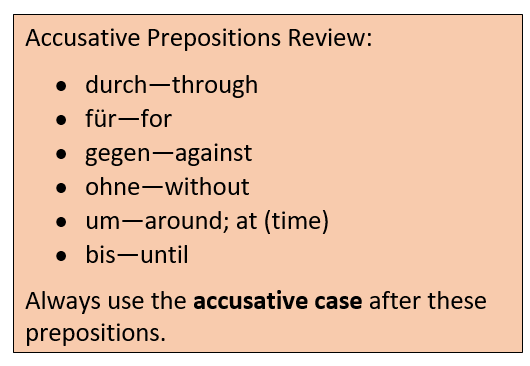
Beispiel:
- Wir fahren durch die Stadt.
- Er läuft um den See.
- Das Auto fährt gegen die Straßenlaterne.
If you need a review of the accusative case prepositions, feel free to watch Anja’s video:
Or do Claudia Kost’s and Crystal Sawatzky’s (University of Alberta) review exercise on accusative prepositions:
NEU!!! There is also a set of prepositions that are always followed by the dative case.
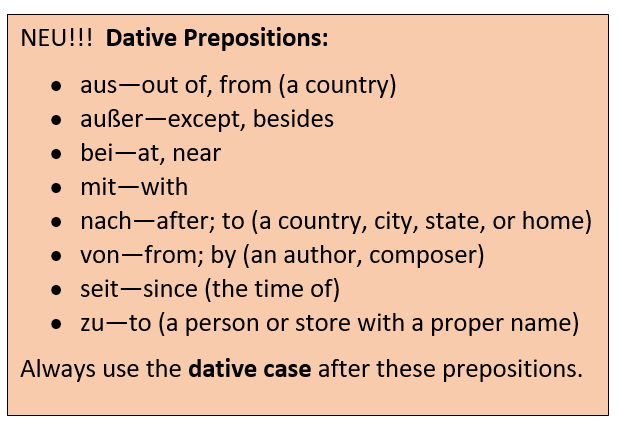
FRAGE: But how do I remember all these dative prepositions?
ANTWORT: By singing the “Dative Prepositions Song.” You can find it here.
Or try this one with a dancing gorilla if you prefer something more modern.
Whenever you see these dative prepositions, put the word after them in the dative case. In the following examples, the nominative form of the noun is compared to the dative form.
Wir sehen aus dem Fenster.
(das Fenster→dem Fenster)
Alle sind hier außer meinem Bruder.
(mein Bruder→meinem Bruder)
Der Student wohnt bei seiner Tante.
(seine Tante→seiner Tante)
Ich arbeite mit diesen Studenten.
(diese Studenten→diesen Studenten)
Du schläfst nach der Arbeit.
(die Arbeit→der Arbeit)
Ihr geht jeden Tag zu der Universität.
(die Universität→der Universität)
Seit der Party ist Anja krank.
(die Party→der Party)
Wir bekommen ein Sofa von einer Freundin.
(eine Freundin→einer Freundin)

QUICK LISTENING: Listen to Max, AudioLingua, talk about what he doesn’t eat using the dative preposition außer. Was isst er nicht?
Depending on the noun, it might not need to be declined, for example if you’re putting a month or a person’s name after the dative preposition.
Wir lernen Deutsch seit August.
(It would sound strange here if you said, “We’re learning German since the August.”)
Das ist ein Buch von J.R.R. Tolkien.
(It would sound strange here if you said, „That is a book by the J. R. R. Tolkien.”)
Der Tisch ist aus Holz.
(It would sound odd if you said, “The table is made out of the wood,” unless it’s a specific wood known by context.)

Watch Learn German’s video to see lots of examples that illustrate the difference between aus and von.
Click to see me reteaching dative prepositions:
Ex. C: Mit. Mit wem machen Sie die folgenden Aktivitäten? Sprechen Sie mit einem Partner/einer Partnerin.
Beispiel: Mit wem sehen Sie fern?
→Ich sehe mit meinem Vater fern.
- Mit wem gehen Sie gern ins Restaurant?
- Mit wem spielen Sie gern Karten?
- Mit wem lernen Sie?
- Mit wem kochen Sie gern?
- Mit wem räumen Sie auf?
- Mit wem können Sie nicht arbeiten?
- Mit wem sprechen Sie Deutsch? Englisch?
- Mit wem reisen Sie gern?
Ex. D: Seit. Seit wann machen Sie die folgenden Sachen? Sprechen Sie mit einem Partner/einer Partnerin.
Beispiel: Seit wann lernst du Deutsch?
→Ich lerne seit einem Jahr Deutsch.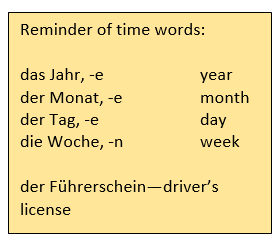
- Seit wann sprichst du Englisch?
- Seit wann kannst du schwimmen?
- Seit wann studierst du an dieser Uni?
- Seit wann gibt es das Coronavirus?
- Seit wann kannst du lesen?
- Seit wann hast du den Führerschein?
Ex. E: Bei. Bei wem wohnen Sie? Sprechen Sie mit einem Partner/einer Partnerin.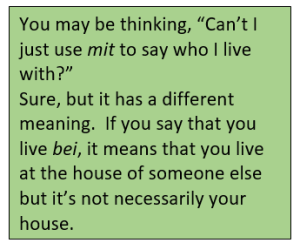
- Bei wem wohnst du?
- Bei wem wohnt dein Bruder/deine Schwester?
- Bei wem wohnt dein Hund/deine Katze?
- Bei wem wohnen deine Freunde?
Ex. F: Zu. Zu wem gehen Sie? Sprechen Sie mit einem Partner/einer Partnerin.
- Zu wem gehen Sie nach dem Unterricht?
- Zu wem gehen Sie nach der Arbeit?
- Zu wem gehen Sie nach der Party?
- Zu wem gehen Sie nach der Deutschstunde?
Deutsche Musik. Listen to Blümchen’s song, Liebe Liebe (1996), to hear examples of the dative case and dative prepositions.
Contractions with Dative Prepositions
In English, we often contract words to make a shorter form of them. They can be used in the long form or the short form.
can’t—cannot
don’t—do not
won’t—will not
it’s—it is
they’re—they are
Similarly, there are certain prepositions in German that can be contracted to make a shorter form.
bei + dem = beim
von + dem = vom
zu + dem = zum
zu + der = zur
They work just like our English contractions; you can either use them
or keep them the long way.
Der Mann arbeitet bei dem Restaurant.
ODER
Der Mann arbeitet beim Restaurant.

More often than not, you will hear example like these contracted to the short form. If you want to emphasize them, however, they may be left in the long form.
Der Mann arbeitet bei dem Restaurant.
(As opposed to that other restaurant.)
Prepositions can only be contracted with definite articles—NOT indefinite articles or possessive adjectives.
CAN contract: Die Katze geht zu dem Kind. → Die Katze geht zum Kind.
CANNOT contract: Die Katze geht zu einem Kind.
Ex. H: Kurzform? Can the following prepositional phrases contract? If so, restate the sentence with the short form.
-
Ich gehe zu meiner Tante.
2. Wir arbeiten bei dem Laden.
3. Ich komme gerade von dem Chef.
4. Wir lernen nach der Arbeit.
5. Das Geschenk kommt von einem Freund.
6. Die Kinder gehen morgen zu der Schule.
7. Fährst du morgen zu der Chefin?
8. Er wohnt bei seiner Großmutter.
Ex. I: Making Questions: Listen to Fabian, AudioLingua, introduce himself. Write five questions that could ask the information he describes. At least one should use the dative preposition bei: bei wem.
Ex. J: Nicos Weg. Episode 36: Zu spät!? Watch episode 36 and do the online activities. You will review the simple past of sein, which you learned earlier this chapter. You will also use the simple past of the verb haben, which has not yet been covered in this book. Use the chart at your right to help you complete those exercises.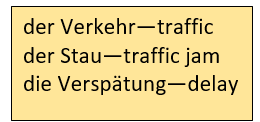
https://learngerman.dw.com/en/zu-sp%C3%A4t/l-37460778
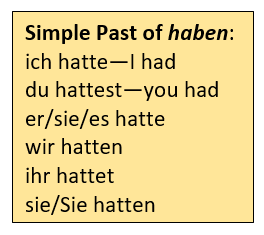
Ex. K: Nicos Weg. Episode 37: Ich bin Lehrerin. Watch episode 37 and do the online activities. You will review the accusative case and possessive adjectives.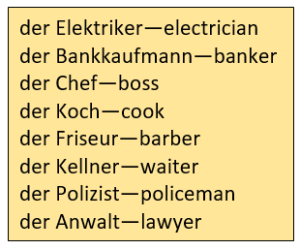
https://learngerman.dw.com/en/ich-bin-lehrerin/l-37469204
EXTRA PRACTICE: Go to Germanzone.org’s website to practice using the definitions of each dative preposition.

